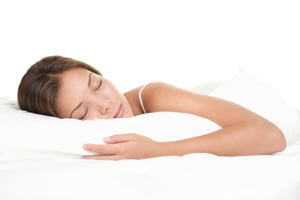 Sleep is a crucial time when the body rejuvenates and repairs itself. Getting enough of each of the four main stages of sleep is vital to keep us feeling healthy, energized, and productive. However, there are many ways in which the sleep cycles can be disrupted, leading to restless nights and sluggish days. Commonly, regular struggles with sleep can be tied to a specific sleep disorder, and while there are many, there are four in particular which are often the source of trouble:
Sleep is a crucial time when the body rejuvenates and repairs itself. Getting enough of each of the four main stages of sleep is vital to keep us feeling healthy, energized, and productive. However, there are many ways in which the sleep cycles can be disrupted, leading to restless nights and sluggish days. Commonly, regular struggles with sleep can be tied to a specific sleep disorder, and while there are many, there are four in particular which are often the source of trouble:
- Sleep Apnea - Sleep apnea is a condition in which the sufferer experiences episodes of paused breathing throughout the sleep cycle. These pauses can last for 10 seconds or more and can occur multiple times each hour. As a result, oxygen levels in the blood drop and the brain rouses the sleeper to wake briefly and take in more air.
- Narcolepsy - Narcolepsy can be characterized as both a sleep and neurological disorder. Sufferers fall asleep unexpectedly and may experience excessive drowsiness throughout the day. A mutation on the 12th chromosome is responsible for the condition, and episodes are believed to be triggered by a combination of chemical imbalances in the brain and environmental stressors.
- Restless Leg Syndrome (RLS) - Restless legs syndrome (RLS) is a condition in which sufferers experience an uncomfortable feeling in their legs and an irresistible urge to move them. In most cases, these symptoms appear in the evening hours while sitting or lying in bed. The condition can begin at any age and tends to worsen over time.
- Insomnia - Insomnia is the inability to fall or stay asleep. It can impact anyone and ranges widely in severity. Some may only experience occasional bouts of insomnia, whereas others may have episodes that last for months or even years. Insomnia can be either primary or secondary. Primary insomnia is isolated and is not the result of any other medical condition or medication. Secondary insomnia, on the other hand, can result from a mental or physical health condition or as a side effect of medication.
Identifying a sleep disorder can make the difference between a healthy, energized body and a constant struggle to feel well. In most cases, a sleep study can help medical professionals reach the necessary diagnosis to begin treatment. To learn more about each of these disorders, including their symptoms and treatment options, click below to download the free sleep disorder guide from Lane Sleep Study Center.




